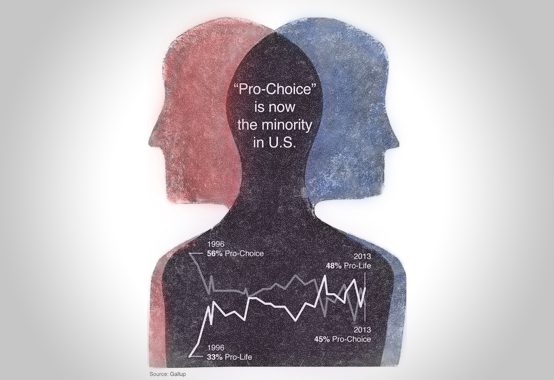How to Win a Culture War

For as long social conservatives have been a force within the Republican Party, moderates and liberals have insisted that their presence hurts the GOP. There is certainly evidence Americans are becoming more socially liberal on some issues.
In May, a Gallup headline read, “Same-Sex Marriage Support Solidifies Above 50% in U.S.: Support has been 50% or above in three separate readings in last year.” In October, the same firm announced, “For First Time, Americans Favor Legalizing Marijuana: Support surged 10 percentage points in past year, to 58%.” Medical-marijuana initiatives have been widely successful, and now recreational marijuana has become legal in places like Washington and Colorado. More states may soon follow.
A poll conducted in April by the Public Religion Research Institute showed that older Americans and white evangelical Protestants were the two groups most opposed to same-sex marriage and relaxing marijuana laws. But attitudes are changing even among Christians, as a Religion News Service interview with PRRI Research Director Daniel Cox revealed:
“We see these generational differences even among certain religious communities,” said Cox. According to the poll, younger Christians, too, are twice as likely to see marijuana use as morally acceptable compared to older Christians. “It’s forecasting a future where the majority of Christians will likely also favor legalization, although they’ll likely be a little bit behind Americans overall,” Cox said.
Yet if Americans—particularly younger ones, including Christians—are increasingly embracing same-sex marriage and marijuana legalization, public opinion is tacking rightward on the issue that has long inspired conservative culture warriors the most.
In May 2009, a Gallup poll found that 51 percent of Americans identify as “pro-life” when asked about abortion, compared to 42 percent who label themselves “pro-choice.” The firm noted that this was “the first time a majority of U.S. adults have identified themselves as pro-life since Gallup began asking this question in 1995.”
Then in May 2012, a Gallup headline announced, “‘Pro-Choice’ Americans at Record-Low 41%: Americans now tilt ‘pro-life’ by nine-point margin, 50% to 41%.” And this past July, LifeNews.com ran an item titled, “Another Poll Confirms Young People Under 35 are Strongly Pro-Life.”
Citing data from the National Opinion Research Center, LifeNews.com noted, “First—and in many ways most revealing—guess which age group is the second most pro-life (after those over 65)? The youngest—those under 35! As has explained many times, young people’s opinion may have become more ‘liberal’ on other social issues but not abortion. That speaks volumes.”
Debates about whether social conservatives should surrender in the culture war miss something very important—that it’s not really an either/or proposition. There is no one “culture war.” There are multiple wars.
Social conservatives who still desire a national consensus on traditional marriage or for the drug war will likely continue to find shrinking support. But so will liberals and moderates who still consider being pro-choice on abortion the more popular or “forward-thinking” position. Same-sex marriage and drug decriminalization are seeing success because young people generally support them. Those same young Americans are also coming to view abortion more unfavorably than their parents.
These trends serve to remind us that culture is indeed more important to changing minds on so-called “social issues” than politics is. We’ve had laws against same-sex marriage and marijuana for decades, but the public has become increasingly accepting of both. Today popular entertainment is full of gay characters and drug references, and it has been for some time, reflecting a level of public comfort with both. Openly gay politicians are now commonplace, as are presidents and Supreme Court justices who admit to having used marijuana.
The cultural shift on same-sex marriage and marijuana legalization came first and is only now being reflected in our politics and emerging new policies.
Abortion has been legal since 1973, but polls indicate America is moving in a more pro-life direction. Here, too, culture is making the difference. Rapidly advancing technology allows us to see a child’s development in the womb at earlier stages, clarifying moral questions that used to be more easily obscured. As National Review’s Maggie Gallagher has noted, “Crisis pregnancy centers say very few women who see their babies decide to abort them.”
Young people are generally more tech savvy than their elders, and it is probably hard to share photos of little Johnny in his first trimester on social media, while one’s Facebook friends simultaneously rationalize disposing of little Johnny. 
New technology is forcing Americans of all ideological backgrounds, and even those who are apolitical, to consider the life issue in a whole new light. As the culture changes, perhaps political victories on the pro-life front may also be more achievable in the near future.
And what issue is more important than life? As a practical matter, conservatives would probably do better with voters by becoming less rigid on social issues where Americans are becoming more liberal. But they also stand to gain by doubling down on the issue that should matter most. Even many conservatives are divided on same-sex marriage and the drug war, but virtually all stand strongly for life—something unlikely to change anytime soon.
Perhaps we will continue living in an America where consenting adults can agree to marry members of the same sex or smoke pot legally. But perhaps we will also live in a country that no longer thinks it acceptable to kill children before they are able draw their first breath.
The priorities should be self-evident. And in picking their cultural battles more carefully, conservatives can win them.
Jack Hunter is co-author, with Sen. Rand Paul, of The Tea Party Goes to Washington.
Comments